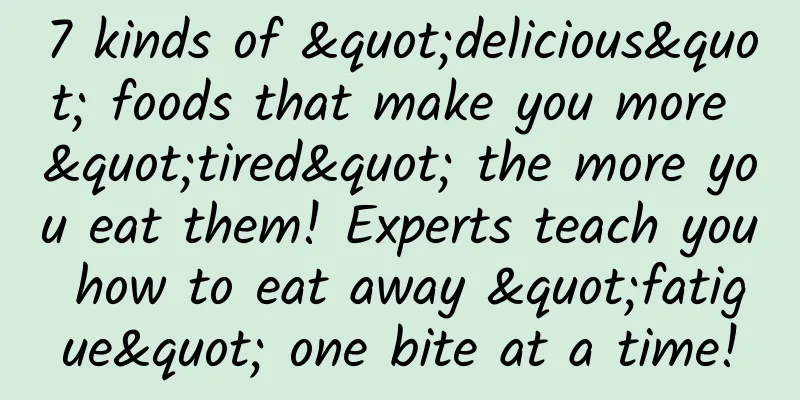7 kinds of "delicious" foods that make you more "tired" the more you eat them! Experts teach you how to eat away "fatigue" one bite at a time!

|
"Spring is sleepy, autumn is tired, summer is napping, winter is sleepy", do you always feel tired and lack of energy all year round? Nowadays, "tired" has become the norm for many people. In addition to irregular life, high mental pressure and lack of rest, eating habits may also be "adding fuel to the fire"! These eating habits may be the culprit for fatigue Eating too little staple food Carbohydrates are the main energy source for the brain and nerves. If you eat too little staple food, the carbohydrate energy supply will be insufficient, and the glycogen stored in the body will be quickly depleted, which can easily lead to water loss and protein and fat decomposition. The large-scale decomposition of protein can easily cause serious muscle loss, causing symptoms such as muscle soreness and fatigue; and when carbohydrates are insufficient, fat cannot be completely decomposed, and a large amount of ketone bodies will be produced, which can easily cause ketoacidosis. The early symptom of ketoacidosis is fatigue. No red meat Red meat, that is, meat from livestock such as pork, beef, and mutton, is rich in iron. If you do not eat red meat for a long time, iron deficiency anemia is likely to occur, and people will feel tired, weak and lack of energy. Sweet tooth Most of the sugar in sweets is monosaccharide or disaccharide, which is quickly digested and absorbed by the human body into the blood. When the blood sugar concentration rises, the secretion of insulin will increase. High insulin level is one of the reasons that cause drowsiness in the human body. In addition, eating too much refined white rice and flour will also cause the insulin level to rise, aggravating fatigue. Eating too much greasy food A large amount of fat entering the small intestine will lead to an increase in the secretion of cholecystokinin by the small intestine, which can promote sleepiness. Don't like drinking water The human body's energy metabolism and body function require water. If the body lacks water by more than 2% of the total body water, fatigue will occur. Healthy people should drink 8 glasses of high-quality water every day and take the initiative to drink boiled water every 2 hours, taking small sips and drinking slowly. Love drinking coffee and strong tea. Both coffee and strong tea contain a lot of caffeine, which can inhibit the adenosine neurotransmitter in the brain. Adenosine is one of the homeostatic factors that regulate sleep. When too much caffeine is consumed, the nervous system will enter an excited state to a certain extent, which will not only affect sleep but also be detrimental to brain relaxation. Love to drink Alcohol can make the brain abnormally active, and drinking even a small amount can reduce sleep quality and put people into a vicious circle of fatigue. To fight fatigue, these foods are recommended Eating the wrong way can lead to fatigue, and eating the right food can soothe your nerves and body. When you feel low in energy, try these foods: Nuts, deep sea fish Nuts such as walnuts and pistachios and deep-sea fish are rich in omega-3 fatty acids, which can re-energize the brain when you are tired. Tips: Nuts are high in oil, so the daily intake should be controlled to a small handful; deep-sea fish is best steamed with less oil and salt, and can replace lean meat and be eaten 2 to 3 times a week. Whole grains Whole grains in staple foods are a major source of B vitamins, which are directly related to the body's energy metabolism. When they are not taken in enough, it will lead to abnormal energy metabolism in the body, and the body's cells and tissues will lack "fuel", showing fatigue, drowsiness, and lethargy. You should eat an appropriate amount of staple food at every meal, and try to combine coarse and fine grains, such as refined rice and white flour with whole grains such as oats, kidney beans, and millet. red beans Sometimes, due to heart fatigue and autonomic nervous system dysfunction, blood pressure fluctuates, leading to symptoms such as chest tightness, palpitations, and shortness of breath. Such people can add red beans to their daily diet. Red beans are rich in trace elements such as potassium, magnesium, zinc, selenium, and B vitamins, which are very important for maintaining a healthy nervous system and regulating heart rhythm. Tips: The skin of red beans is relatively thick, so soak or steam them before eating, let them soften slightly, and then cook them into porridge or make red bean rice with rice. Ginger Muscle soreness is mainly related to the production of lactic acid and histamine. Histamine is an inflammatory factor, and the receptors of soft tissues such as muscles are sensitive to the stimulation of such chemicals, which can cause twitching, pain, etc. Ginger has anti-inflammatory and analgesic effects and can relieve muscle soreness! |
>>: How to prevent and treat “muscle deficiency”?
Recommend
Lighthouse inheritance | "Cross-border scientist" Du Xiangwan: Using a slide rule to calculate China's first hydrogen bomb
If you mention "cross-border scientists"...
Who did Apple kill this time?
[[267204]] This article is authorized to be publi...
Great news! A salt-tolerant rapeseed has emerged? | Expo Daily
my country has made a breakthrough in developing ...
Answers to the WeChat ban on Xiaohongshu’s popular articles, lucky draws, and traffic diversion
Xiaohongshu has become popular due to its grass-p...
2020 Zero-cost Money-Making Strategy, Even a Newbie Can Make 200+ a Day [Video Tutorial]
2020 Zero-cost Money-Making Strategy, Even a Newb...
The external form and underlying logic of event promotion!
Why build event marketing tools? What is the purp...
Why is the Note 7 explosion treated differently in the Chinese market? Samsung still has no explanation
Today, Samsung officially held a Note 7 briefing,...
Master Fang Wenshan shares his lyrics writing course
Master Fang Wenshan responded that he is the best...
Is breast cancer a disease exclusive to women? Will it not recur five years after surgery? Here comes the truth!
Author: Hu Zhongdong, deputy chief physician, reg...
How should the landing page be designed during the information flow delivery process?
Before I start this article, I want to ask you a ...
Winners and losers after Apple tweaked iOS 14 privacy settings
According to reports, Apple is expected to adjust...
How to write a clear and organized promotion plan?
I have heard many of my friends and colleagues ta...
How much does it cost to promote a soft article? How much does it cost to write an original soft article?
As the saying goes, it is better to practice your...
Unveiling the mystery of mobile phone HiFi being “cold on the outside but hot on the inside”: Is it due to technological differences or costs?
"HiFi mobile phone" - when hearing this ...
Fanyin's "Kuaishou Short Video Explosion and Monetization" cracks the code to increase video clicks and doubles the traffic of works
This set of training courses includes Fanyin’s Ku...









